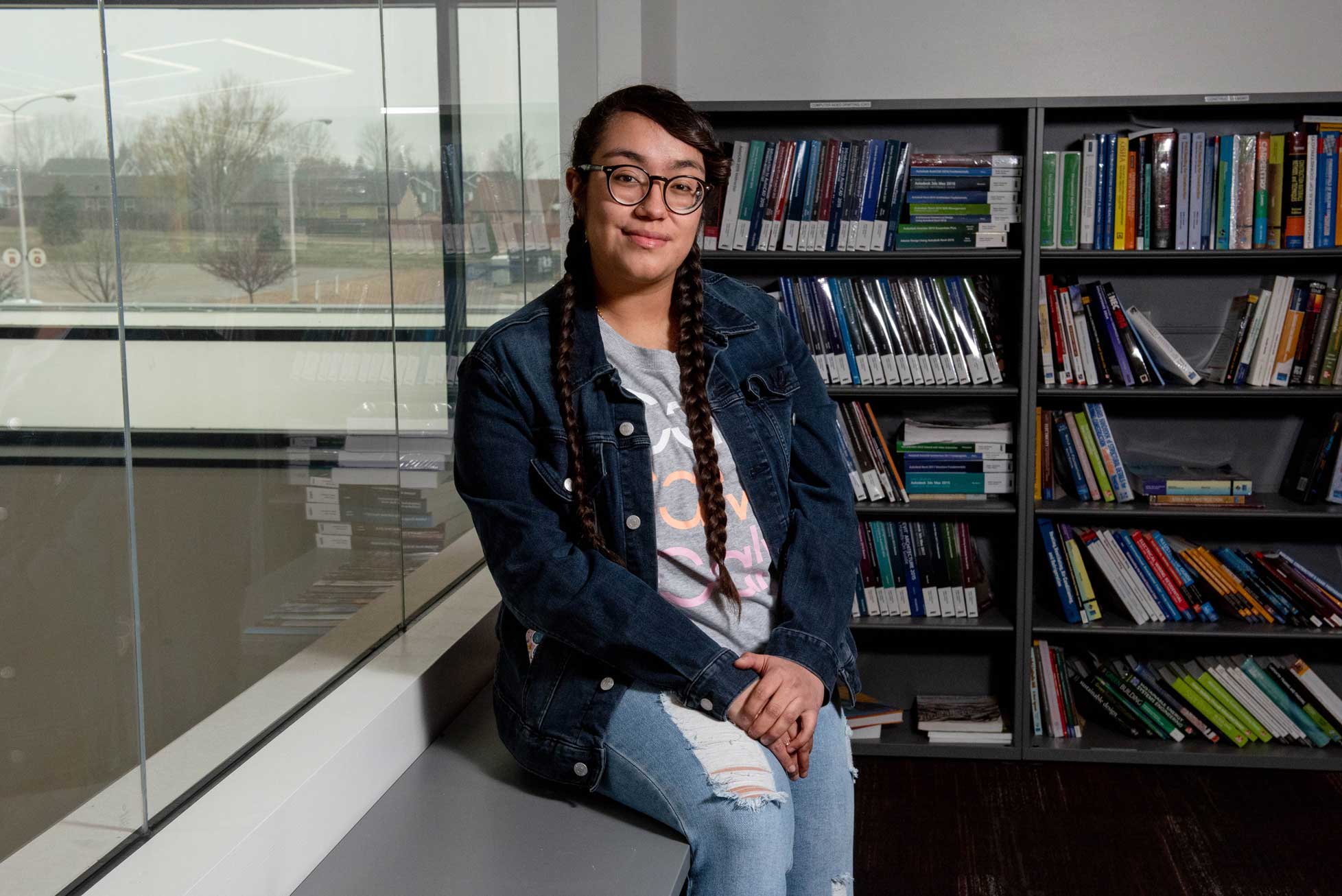
Noemí Gutierrez says the National Farmworker Jobs Program “completely changed my life.” Photos by Valerie Mosley
Noemí Gutierrez says the National Farmworker Jobs Program “completely changed my life.” Photos by Valerie Mosley
Before Noemí Gutierrez enrolled in Aims Community College in Fort Lupton, Colo., she worked on a farm outside of Brighton, a small city northeast of Denver out on the plains. It was exhausting work. Her days started at 5 a.m. and often didn’t end until 6 p.m.—hours spent packing vegetables, and sorting and cleaning green beans, sometimes in 100-degree temperatures.
“Your whole body hurts,” Gutierrez told me, recalling how she’d arrive home too tired to do anything but shower, eat and fall asleep.
Born in California, Gutierrez moved back to Mexico with her parents and two brothers when she was five so her dad could arrange documentation paperwork for her mom. In 2016, the family moved to Colorado, settling in Brighton where Gutierrez’s uncle owned a farm. She was 15 years old and starting school in the U.S. as a sophomore without speaking English.
“Everything was new for me,” she said. “When I started working on the farm, I realized I want to do something different. I wanted to get a career—a bachelor degree. I wanted to change the history of my family.”
Still, college felt out of reach. Gutierrez’s parents encouraged her, but as non-English speakers, they could not help guide her through the application process, nor could they help her financially.
One day at the farm, Noemí Gutierrez learned about the National Farmworker Jobs Program, a federally funded initiative created under the 1964 Civil Rights Act. The program works through the U.S. Department of Labor, which offers grants to community-based organizations that help seasonal and migrant farmworkers achieve better economic stability. In Colorado, a nonprofit called Rocky Mountain Service, Employment and Redevelopment (RMSER) administers the National Farmworker Jobs Program. To do that, RMSER offers tuition scholarships for community college or vocational programs and job training as well as stipends for food, rent and clothing.
An outreach worker with RMSER connected Noemí Gutierrez with Lourdes Gutierrez (no relation), the northern workforce area manager for RMSER, who helped her apply for the program, which paid for her tuition at Aims, her books and even gave her a check for a month of rent and a voucher for food—money that also helped Noemí Gutierrez’s parents, who are unable to work as much now that they are older.
“This program completely changed my life,” Noemí Gutierrez said.
* * *
Though farmworkers play a vital role in putting food on our tables, their labor is among the lowest paid in the country. In Colorado, they earn an average of $34,910 annually (as of May 2020) or $17.63 per hour, with no mandated overtime benefits and few worker protections. The COVID-19 pandemic has only exacerbated the economic and health inequities facing the people who work in America’s fields and in food-processing factories. Agricultural workers, who were deemed “essential,” did not have the luxury of working from home, safe from COVID-19, and compared to other industries, ended up suffering some of the highest infection rates in the nation.
Those vulnerabilities have made the services and opportunities provided through the National Farmworker Jobs Program more critical than ever, allowing farmworkers and their children to escape the low wages and economic precarity of seasonal agricultural work. This year, RMSER received $1.3 million in funding for the program, helping around 300-400 farmworkers a year out of an estimated 3,000-4,000 eligible in Colorado, the majority of whom identify as Latino or Hispanic, and 60% of which are female, said Leon Ortega, the director of workforce programs at RMSER.
To qualify for the program, individuals must work primarily in agriculture and have U.S. citizenship or permanent residency—leaving out the sizeable number of farmworkers who are undocumented (according to the U.S. Department of Agriculture, more than half of the 3 million farmworkers in the U.S. are undocumented). Dependents of farmworkers can also qualify for the National Farmworkers Jobs Program, as can immigrants who have legal status through the Deferred Action for Childhood Arrivals program.
Before Noemí Gutierrez got the scholarship, she worried about money. “It made me feel like maybe I wouldn’t be able to keep studying—maybe I’d have to keep working and stop school,” she told me. Thanks to the program, she’s currently in her second year at Aims studying criminal justice and wants to be a social worker. “I want to be able to help people like me, to show them that there’s opportunities.”
* * *
Karla Garcia almost gave up on her goal of attending college before she even started. Born in Brighton, her parents are farmworkers who immigrated from Guanajuato, Mexico without a high school education.
“It’s just been work and work and work for them,” she said of her parents. “They wanted me to further my education, but they didn’t know how to guide me, or help me financially—they didn’t know how much college actually costs.”

Karla Garcia, who also enrolled in the National Farmworker Jobs Program, now attends the University of Northern Colorado.
On Garcia’s first community college tour in Denver, she had a panic attack and walked out. “When they started about tuition and the classes required and all the requirements, I thought, ‘this is insane,’” she told me.
A few weeks later, RMSER visited the Little Valley Nursery in Brighton where Garcia’s dad works, and passed out information about the National Farmworkers Jobs Program. Garcia’s father told her there was a scholarship program for college students and passed her RMSER’s number. Later, Lourdes Gutierrez helped Garcia apply for the program and talked her through the process of attending college.
Last spring, Garcia, now 21, graduated from Aims Community College with an associate’s degree and enrolled at the University of Northern Colorado, where she’s majoring in human services with a minor in psychology. On top of her classes, she works at the local Boys & Girls Club of Weld County to help cover her books and other expenses (the National Farmworkers Jobs Program pays for her tuition).
The food stipends she has received through the program have also helped her family deal with their financial stress. Her dad started a landscaping business right before the pandemic hit and work has been slow, while her mom works part time at a dairy so she can take care of Garcia’s three-year-old sister. After Garcia graduates next spring, she hopes to get a master’s in public health or a mentorship job helping high school students.
In high school, Garcia often felt lost; she didn’t like school and was unsure of what she wanted to do with her life. But towards the end, something clicked.
“I don’t want to work in a farm after high school,” she said. “I don’t want to be struggling like my parents. I opened my eyes and was like, dang, furthering my education is something I need to do.”
* * *
Education is one of the best ways for farmworkers and their families to escape the chronic financial insecurity that many are facing. In Colorado, wages for agricultural work and many other industries have not kept pace with the rising cost of living, particularly housing prices; for example, while there was a 45% rise in farmworker wages statewide from 2011 to 2020, in Weld County—the biggest agricultural producer of any Colorado county—had housing costs nearly double during the same period.
Recently, a single mother came into Lourdes Gutierrez’s office; the woman makes $12,000 a year, which she uses to support herself and her three children. Lourdes Gutierrez wondered: “How does she do it?”
“There’s so much need,” she added. “Without these programs I don’t think they’d be able to survive.”
In Colorado, farmworkers do not have the right to the state’s minimum wage of $12.32 per hour (though some agricultural workers already make above that level). Nor do they have the right to unionize and strike. In February, a state Senate committee advanced a bill that would include agricultural workers under Colorado’s labor and employment protections, including minimum wage and overtime rights. The Agricultural Workers’ Rights bill is currently under consideration, and RMSER’s Gutierrez hopes the bill will pave the way for higher wages for farmworkers and better benefits.
In the meantime, RMSER has a new venture with MedCerts, a national online training platform that’s funded through the jobs program and offers farmworkers a flexible course of study in the IT and health care fields—both of which typically offer more stable careers and higher wages.
“The exciting part is the career growth,” said Sandy Mead, MedCerts’ national director of workforce development. “If you get someone with no experience, you can get their foot in the door in a medical office, where their certification in medical billing and coding could lead them up to a great career path on the office side of health care.”
Before Natalie Calderon, 19, enrolled in the National Farmworker Jobs Program, she worked in a greenhouse in Brighton and was borrowing money from her dad to pay for college. But in her first year of college, she learned about the scholarships available through the National Farmworker Jobs Program from her aunt and applied. The financial assistance allowed her to leave her greenhouse job and find work as a private nanny instead, which gave her more time to study.
Then, last November, her grandfather died from COVID-19, leaving Calderon’s family scrambling to figure out caretaking for her grandmother. She opted to start MedCert’s medical coding certification on top of her community college classes because it would lead to a job that could be done remotely—a safer job option during a pandemic. On Sundays, she still has time to go over to her grandmother’s house to help cook and clean, fitting in her coursework on afternoons after her nannying and tutoring jobs.
“It’s providing me with a stable opportunity that I wouldn’t have otherwise,” she said.
For Lourdes Gutierrez, the MedCerts program is an affirmation of farmworkers’ talents and work ethic. Most speak two languages—a sought-after skill in many workplaces—and balance their studies with multiple jobs and family responsibilities.
“I believe sometimes people take farmworkers for granted,” she said. “They have no idea how hard they work.”